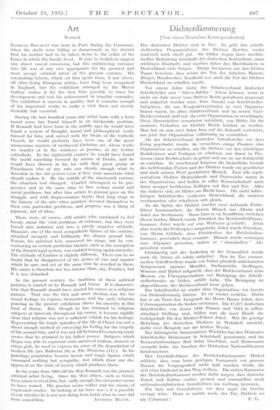Art
Rouault
GEORGES ROUAULT was born in Paris during the Commune, when the shells were falling so dangerously in the district that his mother had to be taken down to the cellar of the hausa in which the family lived. It may be foolish to suggest any direct causal connexion, but this embittering entrance into life was at any rate appropriate for the greatest and most savage satirical artist of the present century. His astonishing talents, which set him apart frOm, if not above, all other living European artists, have long been recognised in England, but the exhibition arranged by the Mayor Gallery makes it for the first lime possible to trace his development and test his achievement in tangible 'examples. The exhibition is uneven in quality, but it contains enough of his important works to make a visit there not merely desirable but essential.
During the last hundred years any artist born with a keen moral sense has found himself in an intolerable position. If Rouault had been born in the middle ages he would have found a system of thought, moral and philosophical, ready formed for him, and, armed with the ideals of the Catholic Church, he would probably have been one of the great anonymous masters of mediaeval Christian art, whose works we wonder at in the windows or Torches of the Gothic cathedrals. In the eighteenth century he would have found the world marching forward by means of Doubt, and he would have thrown in his lot with that great group of Frenchmen who at any rate saw clearly „enough what to demolish in the old system even if they were uncertain what should replace it. By the middle of the nineteenth century the situation had Changed. Courbet attempted to be pro- gressive and at the same time to face serious moral and social problems, but after him artists in general gave up the struggle, and with Impressionism begins that long stage in the history of the arts when painters devoted themelves to their own particular problems, and progress was a thing of pigment, not of ideas.
There , 'were, of course, still artists who continued to feel keenly about the vital problems of existence, but they were forced into isolation and into a purely negative attitude. Daumier, one of'the most sympathetic figures of the century, attacked savagely and brilliantly the abuses around him. Forain, his spiritual heir, narrowed his range, but by con- centrating on certain particular themes, such as the corruption of the French legal system, was enabled to keep up his intensity. The attitude of Lautrec is slightly different. There can be no doubt that he disapproved of the scenes of vice and squalor Which he saw, and yet at the same time he revelled in them. His satire is therefore not less intense than, say, Forain's, but it is less detached.
In the present century the tradition of these satirical painters is carried on by Rouault and Grosz. It is character- istic that Rouault should have started his career as a religious painter. That was the first and most obvious way for his
• moral feelings to express themselves, and the early religious painting in the present exhibition shows his sincerity in this kind of theme. But, though he has returned to religious subjects at intervals throughout his career, it became rapidly clear that religion was not a sufficient vehicle for his feelings. Representing the tragic episodes of the life of Christ was not a direct though method of conveying his feeling for the tragedy of life around him, and it was not till he turned to contemporary scenes that he attained to his fullest power. Subjects which Degas was able to represent with unmoved realism, dancers or circus girls, he used to express his sense of the degradation of Modern life .(see Ballerina (8) or The Musician (11) ). In his paintings prostitutes become heroic and tragic figures which command nothing but sympathy, but which draw our dis- approval on the state of society which produces them.
In the,years from 1005 till the War Rouault was the greatest satirical artist living. Since the War others, such as Grosz, have arisen to rival him, but, sadly enough, his own poWer seems to have waned. His passion seems colder and his means of expression cruder. In looking at his later wolAs it is possible to ask whether he is not now doing from habit. what he once did


























































 Previous page
Previous page